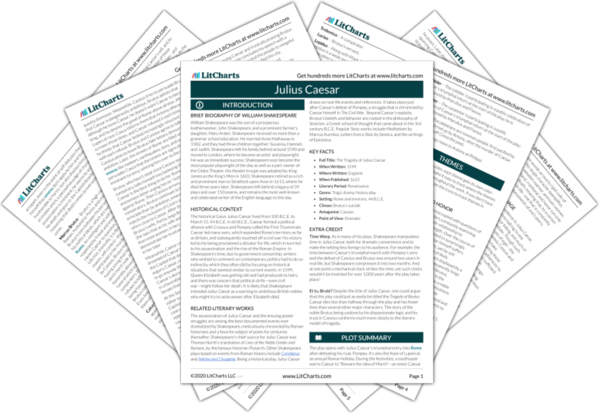Julius Caesar Quotes in Julius Caesar
“Beware the ides of March.”
Men at some time are masters of their fates:
The fault, dear Brutus, is not in our stars,
But in ourselves, that we are underlings.
Let me have men about me that are fat;
Sleek-headed men, and such as sleep o' nights.
Yond Cassius has a lean and hungry look;
He thinks too much: such men are dangerous.
But those that understood him smil'd at one another, and shook their heads; but for mine own part, it was Greek to me.
Cowards die many times before their deaths;
The valiant never taste of death but once.
Of all the wonders that I yet have heard,
It seems to me most strange that men should fear;
Seeing that death, a necessary end,
Will come when it will come.
Caesar: The ides of March are come.
Soothsayer: Aye, Caesar, but not gone.
Et tu, Bruté? — Then fall, Caesar!
Friends, Romans, countrymen, lend me your ears;
I come to bury Caesar, not to praise him.
The evil that men do lives after them;
The good is oft interred with their bones;
So let it be with Caesar. The noble Brutus
Hath told you Caesar was ambitious:
If it were so, it was a grievous fault;
And grievously hath Caesar answer'd it.
Here, under leave of Brutus and the rest, —
For Brutus is an honorable man;
So are they all, all honorable men, —
Come I to speak in Caesar's funeral.
He was my friend, faithful and just to me:
But Brutus says he was ambitious;
And Brutus is an honorable man.
Remember March, the ides of March remember:
Did not great Julius bleed for justice' sake?
What villain touch'd his body, that did stab,
And not for justice? What, shall one of us
That struck the foremost man of all this world
But for supporting robbers, shall we now
Contaminate our fingers with base bribes,
And sell the mighty space of our large honours
For so much trash as may be grasped thus?
I had rather be a dog, and bay the moon,
Than such a Roman.
This was the noblest Roman of all
All the conspirators, save only he,
Did that they did in envy of great Caesar;
He only, in a general honest thought,
And common good to all, made one of them.
His life was gentle; and the elements
So mix'd in him that Nature might stand up
And say to all the world, "This was a man."

Julius Caesar Quotes in Julius Caesar
“Beware the ides of March.”
Men at some time are masters of their fates:
The fault, dear Brutus, is not in our stars,
But in ourselves, that we are underlings.
Let me have men about me that are fat;
Sleek-headed men, and such as sleep o' nights.
Yond Cassius has a lean and hungry look;
He thinks too much: such men are dangerous.
But those that understood him smil'd at one another, and shook their heads; but for mine own part, it was Greek to me.
Cowards die many times before their deaths;
The valiant never taste of death but once.
Of all the wonders that I yet have heard,
It seems to me most strange that men should fear;
Seeing that death, a necessary end,
Will come when it will come.
Caesar: The ides of March are come.
Soothsayer: Aye, Caesar, but not gone.
Et tu, Bruté? — Then fall, Caesar!
Friends, Romans, countrymen, lend me your ears;
I come to bury Caesar, not to praise him.
The evil that men do lives after them;
The good is oft interred with their bones;
So let it be with Caesar. The noble Brutus
Hath told you Caesar was ambitious:
If it were so, it was a grievous fault;
And grievously hath Caesar answer'd it.
Here, under leave of Brutus and the rest, —
For Brutus is an honorable man;
So are they all, all honorable men, —
Come I to speak in Caesar's funeral.
He was my friend, faithful and just to me:
But Brutus says he was ambitious;
And Brutus is an honorable man.
Remember March, the ides of March remember:
Did not great Julius bleed for justice' sake?
What villain touch'd his body, that did stab,
And not for justice? What, shall one of us
That struck the foremost man of all this world
But for supporting robbers, shall we now
Contaminate our fingers with base bribes,
And sell the mighty space of our large honours
For so much trash as may be grasped thus?
I had rather be a dog, and bay the moon,
Than such a Roman.
This was the noblest Roman of all
All the conspirators, save only he,
Did that they did in envy of great Caesar;
He only, in a general honest thought,
And common good to all, made one of them.
His life was gentle; and the elements
So mix'd in him that Nature might stand up
And say to all the world, "This was a man."
















